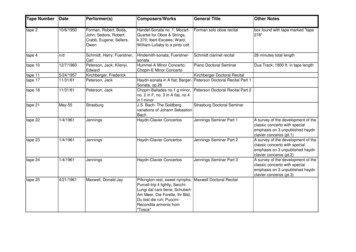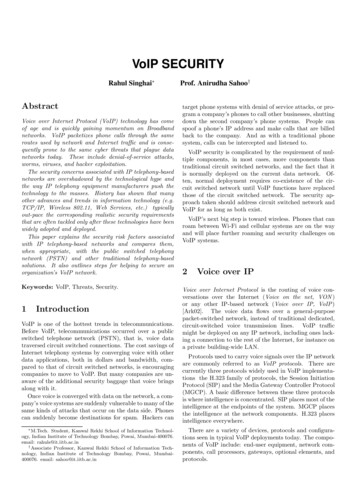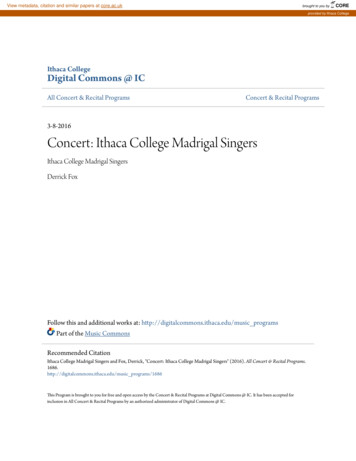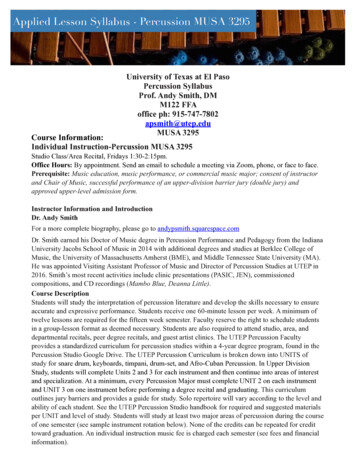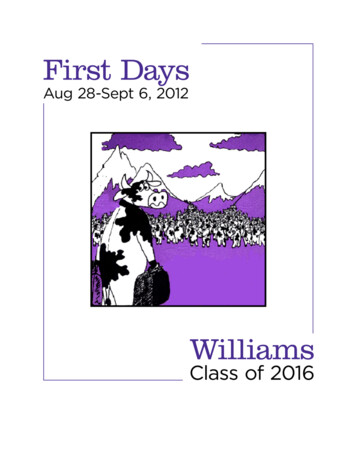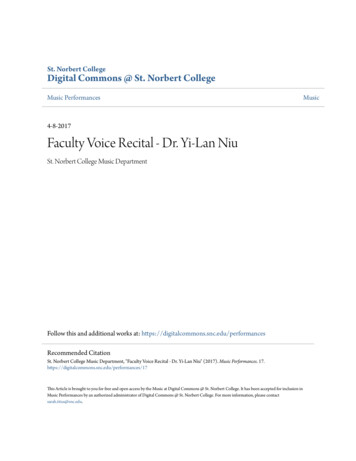
Transcription
St. Norbert CollegeDigital Commons @ St. Norbert CollegeMusic Performances4-8-2017Faculty Voice Recital - Dr. Yi-Lan NiuSt. Norbert College Music DepartmentFollow this and additional works at: nded CitationSt. Norbert College Music Department, "Faculty Voice Recital - Dr. Yi-Lan Niu" (2017). Music Performances. his Article is brought to you for free and open access by the Music at Digital Commons @ St. Norbert College. It has been accepted for inclusion inMusic Performances by an authorized administrator of Digital Commons @ St. Norbert College. For more information, please contactsarah.titus@snc.edu.Music
Faculty RecitalDr. Yi-Lan Niu, SopranoEllyses Kuan, PianoChristopher Cramer, Classical GuitarSaturday, April 8, 2017Dudley Birder Hall2:00 p.m.
Before the Concert I always enjoy looking at an object from many different angles and it is always interestingto understand different cultures through different lenses. My first motivation in presentingthis performance comes from an article where I learned that the opera composer Puccinidecided to write his famous opera Turandot after he found an old music box playing aChinese folk tune called “Jasmine” at a flea market. My second motivation is that I amworking with Dr. Christopher Cramer (guitarist from the United States) and Ms. EllysesKuan (pianist from Hong Kong) who both have a deep admiration for Chinese literature.This recital is a project that evolves the central topic “Chinese”. It includes music writtenby Western composers, such as Puccini and Mahler, who never visited the Asian continentdecided to write “oriental” music based on their fascination with Chinese stories. It alsoincludes music pieces composed by Chinese composers who received Western musictraining. This recital presents the idea of how original literature and music travels acrossthe borders of continents and influences and inspires people in different ways. Thepreparation of this recital has been an exciting journey. I learned that as a Chinesedescendant and a western-trained musician, it is extremely difficult for me to define themeaning of ‘”authentic” music because music itself has no barrier when the audience triesto understand it. Music is about living, loving and dying and that is what life is, whereverwe go.I hope you enjoy the concert,Yi-Lan Niu
Program “Songs from the Chinese” Benjamin Britten (1913-1976)1.2.3.4.5.6.“The Big Chariot”“The Old Lute”“The Autumn Wind”“The Herd-boy”“Depression”“Dance Song”Arias“Signore alscolta” from Turandot .Giacomo Puccini (1858-1924)“I am a wife of Mao Tze-Tung” from Nixon in China .John Adams (1947-)Song“Von der Schӧnheit” from Der Lied von der Erde .Gustav Mahler (1860-1911)IntermissionPiano SoloSuite in E-Phrygian Mode (Suite of Homeland) Seng-Shih Lin (1914-1991)I.II.III.Allegro moderatoAndante molto SostenutoAllegrettoSongs1. “Forget my Thoughts” .Yau-Tai Hwang (1912- 2010)2. “Longing” .Seng-Shih Lin (1914-1991)3. “A girl who is born to sing” Chinese Folk TuneMusical Theater“I enjoy being a Girl” from Broadway Musical, Flower Drum Song .Richard Rodgers(1902-1979)
BiosVoice: Dr. Yi-Lan NiuDr. Yi-Lan (Elaine) Niu started her music training at the age of four. She completed her master’sdegree in voice at the Eastman School of Music and her doctoral degree in vocal performance atthe University of Wisconsin-Madison. Throughout her academic career, Dr. Niu has been therecipient of numerous awards and scholarships including the Joyce and William WartmannScholarship, UW-Madison Opera Props Award, and scholarships to the Hot Springs MusicFestival, the Madison Early Music Festival, and the Vancouver Early Music Festival.Dr. Niu has served on the faculties at both Ripon College and the Madison Academy of Music.Additionally, she has taught voice as an instructor at the Summer Music Clinic at the Universityof Wisconsin-Madison.Dr. Niu performs internationally, and her performances are often broadcasted by National PublicRadio in both Asia and North America. She actively premieres works written for her, includingRequiem by Alexander Nohai-Seaman from Long-Island, New York, and contemporary artsongs by Dr. Jerry Hui from Hong Kong. She is one of the co-founders of classical guitar andvoice ensemble, Niu-Cramer Duo. This ensemble collaborates closely with both experienced andyoung composers and performs regularly to promote all types of music written for voice andguitar. Her most famous solo repertoire includes the soprano pieces from Messiah by GeorgeFrideric Handel, Carmina Burana by Carl Orff, Magnificat by John Rutter. Her numerousoperatic roles include Clorinda in Combattimento di Tancredi e Clorinda, Costanza in LaGriselda, Serpina in La Serva Padrona, and Papagena in The Magic Flute.Piano: Ms. Ellyses KuanConcert pianist and a native of Hong Kong, Ellyses started taking piano lessons at age three. Shereceived a full scholarship for her Masters Degree, studying Piano Performance with BarrySnyder at the Eastman School of Music, and was selected to represent Hong Kong at theInternational Kirishima Music Festival in Japan. Among her other major teachers and mentorswere Dr. Siu-Wan Chair Fang, Paul Odette and WU Dao-Wai. She also performed inmasterclasses by John Perry, Dang Thai Son and Malcolm Bilson. Ellyses is enthusiastic aboutchamber music and collaborates with artists from all over the world. She also performs as asoloist and is particularly passionate about Baroque and Classical performance practices, strivingto bring authentic music interpretation to her audiences. Aside from being an active performer,Ellyses is currently the music director of EKS Music School. She taught piano master classes inBoston, New York, Toronto, San Diego and recently Hong Kong. She also organizes and hostshouse concerts at the Alida House Concert Series in the South Shore area in Boston. In 2014,Ellyses was invited by the Boston GuitarFest Roundtable Panel to speak about Entrepreneurshipand Making a Career in Music Work, and her music school was also featured in the BostonGlobe the same year. Ellyses also holds an Information and Library Science degree and practicedas Collection Development and Technical Services librarian for over 10 years before shetransitioned to full-time pursuit of her musician dream. Her goal is to build a community,promote performing arts awareness, and support local young musicians through advocacy,inspiration and performance. She has recently set up a music scholarship fund at her school tosupport quality music programs in the area. Ellyses is also a member of The Duo Amie, aBoston-based cello and piano duo with the vision of bringing people together through the beautyand universality of classical music, while supporting non-profit organizations dedicated to caringfor and enriching our shared community. (www.duoamie.org)
Guitar: Dr. Christopher CramerAs a solo recitalist, concerto soloist, and chamber musician, classical guitarist ChristopherCramer has performed in the United States, Canada, and Asia. From college campuses toperforming arts centers, Dr. Cramer has presented numerous solo recitals featuring an expansiverepertoire that includes masterworks of the past, as well as newly composed works bycontemporary composers. Dr. Cramer made his concerto debut in 2005 performing AntonioVivaldi’s Concerto in D major for guitar and strings with the Madison East Orchestra. Morerecently, he has appeared as soloist with the Manitowoc Symphony Orchestra in a performanceof Joaquín Rodrigo’s Concierto de Aranjuez. As a chamber musician, Dr. Cramer hascollaborated with a variety of instrumentalists and performs regularly with award-winningsoprano Yi- Lan Niu. Concert season highlights have included the world premieres of new worksby Hong Kong composer Chiwei Hui and New York-based composer Alexander Nohai-Seaman,a broadcast performance on Wisconsin Public Radio’s Sunday Afternoon Live from theChazen concert series, and tours of the U.S. and Taiwan, including a featured performance at theprestigious National Taiwan University in Taipei.Dr. Cramer currently serves on the faculty at Beloit College, where he teaches studio guitarlessons and directs the guitar ensemble program. He also teaches guitar related courses at theUniversity of Wisconsin-Madison and the University of Wisconsin-Rock County. Former facultyengagements have included Edgewood College and the University of Wisconsin-Manitowoc. Inaddition to academic teaching, Dr. Cramer also presents programs in schools and communitycenters for those interested in learning more about the guitar and its music.Dr. Cramer began his music studies at the University of Wisconsin-Manitowoc, where he won anumber of awards including the UW-Manitowoc County Fine Arts Award in the Area of Music.He went on to complete his undergraduate training at the University of Wisconsin-Milwaukeeand the Wisconsin Conservatory of Music, where he won first place in the annual WCMscholarship competition in classical guitar. Continuing his studies at the University ofWisconsin-Madison, Dr. Cramer earned both his masters and doctorate degrees in musicperformance under the direction of renowned guitarist Javier Calderón.While at the University of Wisconsin-Madison, Dr. Cramer undertook an intensive study ofinstrumental conducting with respected conductor and pedagogue David E. Becker, ultimatelyleading to a doctoral minor in the discipline and the opportunity to work with the UW-MadisonSymphony Orchestra.
Program NotesSongs from the Chinese, Op.58Songs from the Chinese is a song cycle for soprano/tenor and guitar. The first performance ofthese songs was given by tenor Peter Pears and guitarist Julian Bream at Aldeburgh Festival onJune 17th 1958. The texts of the songs are from the books A Hundred and Seventy ChinesePoems and The Books of Songs translated by British Chinese Scholar Arthur Waley. Most of thepoems are over one thousand years old. After doing some archival research and studying theoriginal poems in Chinese, I found that some of the poems actually carry deeper meanings. Thereare six short songs in this collection. Each song deals with different feelings in life. “The BigChariot” is about a politician reminding people that even though they have an ambition to savethe world, it is inevitable that they will get themselves into unpleasant situations, and in the end,people can only save themselves. “The Old Lute” is about an instrument that loses its color andis out of tune. It is a song of lament. The poet used “the lute” as a symbol for a person who livesin an old world and is feeling lonely because no one pays attention to him. “Depression” is acomplaint about not being in good health. “The Autumn Wind”, “The Herd Boy” and “DanceSong” are in a faster tempo because they are not so emotionally heavy. One interesting fact Ilearned from my research about the “Dance Song” is that unlike the unicorn in Westernfairytales, the Chinese unicorn was a “Creature of God and Blessing”. It has a mind and liveslike a human. It only appears when the world is at peace and people are wise and kind. AChinese unicorn can only be touched or ridden by the most intelligent and compassionate king inthe world and whoever sees this creature is blessed for the rest of their lives.I. The Big Chariot (from The Book of Songs)Don’t help on the big chariot;You will only make yourself dusty.Don’t think about the sorrows of the world;You will only make yourself wretched.Don’t help on the big chariot;You won’t be able to see for dust.Don’t think about the sorrows of the world;Or you will never escape from your despair.Don’t help on the big chariot, the big chariot;You’ll be stifled with dust, be stifled with dust.Don’t think about the sorrows of the worldthink about the sorrows of the worldthe sorrows of the world;You will only load yourself with care.II. The Old Lute (Po Chü-i)Of cord and cassia wood is the lute compounded;Within it lie ancient melodies.Ancient melodies weak and savourless,Not appealing to present men’s taste.Light and colour are faded from the jade stops;Dust has covered the rose-red strings.Decay and ruin came to it long ago,But the sound that is left is still cold and clear.I do not refuse to play it, if you want me to;But even if I play people will not listen.How did it come to be neglected so?Because of the Ch’iang flute and the zithern of Ch’in.
III. The Autumn Wind (Wu-ti)Autumn wind rises; white clouds fly.Grass and trees wither; geese go south.Orchids all in bloom; chrysanthemums smell sweet.I think of my lovely lady; I never can forget.Floating pagoda boat crosses Fên River;Across the midstream white waves rise.Flute and drum keep time, keep time to sound of rowers’ song;Amidst revel and feasting sad thoughts come;Youth’s years how few, age how sure!Youth’s years how few, age how sure!how sure! age how sure, age how sure, how sure!IV. The Herd-Boy (Lu Yu)In the southern village the boy who minds the oxWith his naked feet stands on the ox’s back.Through the hole in his coat the river wind blows;Through his broken hat the mountain rain pours.On the long dyke he seemed to be far away;In the narrow lane suddenly we were face to face.The boy is home and the ox is back in its stall;And a dark smoke oozes through the thatched roof.V. Depression (Po Chü-i)Turned to jade are the boy’s rosy cheeks;To his sick temples the frost of winter clings.Do not wonder that my body sinks to decay;Though my limbs are old, are old,my heart is older, older, older, older yet.VI. Dance Song (from The Book of Songs)The unicorn’s hoofs! The unicorn’s hoofs!The duke’s sons throng, the duke’s sons throng.Alas for the unicorn! Alas for the unicorn! Alas!The unicorn’s brow! The unicorn’s brow!The duke’s kinsmen throng, the duke’s kinsmen throng.Alas for the unicorn! Alas for the unicorn! Alas!The unicorn’s horn! The unicorn’s horn! The unicorn’s horn!The duke’s clansmen throng, the duke’s clansmen throng.Alas for the unicorn! Alas for the unicorn! Alas! Alas!“Signore alscolta” from TurandotThis piece is from Puccini’s opera, Turandot. The opera is about a prince of Persia, Calaf, whofalls in love with the charming, but cold-blooded Chinese princess Turandot. She demands thatwhoever wants to marry her must first answer three riddles, however, if they answer incorrectlythey will die. This aria is sung by Calaf’s servant Liu. Liu loves Calaf and begs him not to riskhis life for the crazy princess.Signore, ascolta! Deh!, signore, acolta!Liù non regge più!Si pezza il cuore! Ahimè,quanto camminocol tuo nome nell’animaLord, hear! Ah, sir, listen!Liu no longer holds, it breaks my heart!Alas, what with your name in my way,with your name on the lips!But if your fate will be decided tomorrow,
col nome tuo nell’labbraMa se il tuo destino,doman, sarà deciso,noi morrem sulla strada dell’esilio.Ei perderà suo figlio.io l’ombra d’un sorriso!Liù non regge più!ha pietà!we die on the road of exile.He would lose his son I am the shadow of a smile.Liu does not hold anymore!Ah!“I am the wife of Mao Tze-tung” from Nixon in ChinaThis aria is from the end of Act II in the opera Nixon in China. The composer, John Adams,wrote this piece in 1987 despite the sensitive political situation between the United States andChina. This opera is inspired by President Nixon’s visit to China in 1972. Adams is famous forhis minimalistic style. The music has short, repetitive motives. This aria is one of the mostperformed pieces from the opera. The vocal line in this piece is dramatic and persuasive. Thetexts are repeated as they promote the “Red Book”. The music is aggressive in order to representthe spirit of the Cultural Revolution that happened during 1966-1976. This piece is performed bythe character Madama Mao, Chian-Ching. In real life, Chian-Ching was a professional actress inChina during WWII before she became interested in politics and married Mao Tze-Tung.I am the wife of Mao Tse-Tungwho raised the weak above the strong.When I appear the people hangupon my words, and for his sakewhose wreaths are heavy round my neckI speak according to the book.When did the Chinese people lastexpose its daughters? At the breastof history I sucked and pissed,thoughtless and heartless, red and blind,I cut my teeth upon the landand when I walked my feet were boundon revolution. Let me bea grain of sand in heaven’s eyeand I shall taste eternal joy.“Von der Schönheit” (“Beauty”) from Der Lied von der ErdeIn composition, Mahler admired Richard Wagner and his sizeable orchestrations. He moved hissongs from the intimacy of a small recital hall into the more dramatic space of a large concerthall. His songs were mostly written for a solo singer (mostly mezzos and baritones) andorchestra. Mahler lived and worked with an extraordinary group of musicians and artists inVienna, including Alexander Zemlinsky, Arnold Schoenberg, Alban Berg, Anton Weben, Hugovon Hofmannsthal and Gustav Klimt. He also met a female composer, Alma Schindler, who laterbecame his wife. Alma’s strong interest in foreign cultures and literature became Mahler’smotivation to write Der Lied von der Erde. The source of the text is from Hans Bethge’s Diechinesische Flöte (The Chinese Flute) which is a translation of ancient Chinese poetry. “Von derSchönheit” is the third of the six pieces in this song cycle and is normally performed by a mezzo-
soprano. The most remarkable sections of this song are the lengthy interludes. Mahler wroteaccompaniments that continually comment on the text and heighten the emotional contentof the words, such as the “Lotosblemen” (lotus-flowers), “Augen” (eyes), “shöne Knaben”(handsome boys), “Rossen” (horses) and “ Herzens” (hearts). The original poem is titled “TheLotus Girl” and was written by the poet Li-Bai (701-761) during the Tang Dynasty in China. It isabout a lotus girl who falls in love with a rich young man who happens to ride his horse with hisfriends at the riverbank. However, the happiness does not last long. The rich man abandons thegirl and she kills herself at the end of the poem. Interestingly, Mahler did not include this sadending in his song. Therefore, the song ends with a light-hearted description of courting and asweet finale.Junge Mädchen pflücken Blumen,Pflücken Lotosblumen an dem Uferrande.Zwischen Büschen und Blättern sitzen sie,Sammeln Blüten in den Schoß und rufenSich einander Neckereien zu.Gold’ne Sonne webt um die Gestalten,Spiegelt sich im blanken Wasser wider,Sonne spiegelt ihre schlanken Glieder,Ihre süßen Augen wider,Und der Zephir hebt mit Schmeichelkosen dasGewebeIhrer Ärmel auf, führt den ZauberIhrer Wohlgerüche durch die Luft.O sieh, was tummeln sich für schöne KnabenDort an dem Uferrand auf mut’gen Rossen?Weithin glänzend wie die Sonnenstrahlen;Schon zwischen dem Geäst der grünen WeidenTrabt das jungfrische Volk einher!Das Roß des einen wiehert fröhlich aufUnd scheut und saust dahin,Über Blumen, Gräser, wanken hin die Hufe,Sie zerstampfen jäh im Sturm die hingesunk’nenBlüten,Hei! Wie flattern im Taumel seine Mähnen,Dampfen heiß die Nüstern!Gold’ne Sonne webt um die Gestalten,Spiegelt sie im blanken Wasser wider.Und die schönste von den Jungfrau’n sendetLange Blicke ihm der Sehnsucht nach.Ihre stolze Haltung ist nur Verstellung.In dem Funkeln ihrer großen Augen,In dem Dunkel ihres heißen BlicksYoung girls picking flowers,Picking lotus flowers at the riverbank.Amid bushes and leaves they sit,gathering flowers in their laps and callingone another in raillery.Golden sun plays about their formreflecting them in the clear water.The sun reflects back their slender limbs,their sweet eyes,and the breeze teasing up the warpof their sleeves, directs the magicof perfume through the air.O see, what a tumult of handsome boysthere on the shore on their spirited horses.Yonder shining like the sun’s raysbetween the branches of green willowstrot along the bold companions.The horse of one neighs happily onand shies and rushes there,hooves shaking down blooms, grass,trampling wildly the fallen flowers.Hei! How frenzied his mane flutters,and hotly steam his nostrils!Golden sun plays about their formreflecting them in the clear water.And the most beautiful of the maidens sendslong looks adoring at him.Her proud pose is but a pretense;in the flash of her big eyes,in the darkness of her ardent gazebeats longingly her burning heart.Suite in E-Phrygian Mode (Suite of the Homeland)
Seng-Shih Lin (1914-1991) was a Chinese conductor, music educator and composer. He receivedhis music training at Shang-Hai Music Conservatory in piano and composition. During WWII,Lin escaped from China to Hong Kong and actively composed music pieces to support theChinese in their fight against the Japanese. Lin died from a major stroke in 1991. Most of hispieces are patriotic. They reveal sentimental longing for his beloved country. There are threemovements in his “Suite in E-Phrygian Mode” and each movement presents music themes fromdifferent provinces in China.Three Chinese Songs“Forget my Thoughts” and “I am Longing” were composed after WWII. The War made atremendous impact on Chinese music. The music tends to focus on people’s daily struggles andtheir desire to regain hope. The first song, “Forget my Thoughts”, is about a woman who wishesto forget all of the hardships in her life, but realizes the pain that she feels actually keeps heralive. The second song, “I am Longing”, has a recurring German 6th chord that represents a senseof yearning throughout the entire piece. The third song is an arrangement of a folk tune fromYunnan, a province of Southwestern China, and is about a girl who enjoys singing in themountains.遺忘 (Forget my Thoughts)若我不能遺忘 這纖小軀體 , 又怎載得起如許沉重憂傷. 人說愛情故事, 值得終身想念. 但是我啊,只 想把它遺忘 .隔岸的野火在燒, 冷風裡樹枝在搖 .我終夜躑躅堤上, 只為追尋遺忘. 但是您啊,卻似天上的星光, 終夜繞著我徜徉, 終夜繞著我 ,終夜繞著我, 終夜繞著我徜徉.隔岸的野火已滅, 夜風裡虫聲四起 . 露濕苔痕, 星月將沉 .誰能將浮雲化作雙翼, 載我向遺忘的宮殿 飛去.有時我恨,這顆心是活.是會跳躍 ,是會痛苦! 但 我又怕遺忘的宮殿喲 ,就連痛苦亦付闕如 .迎接這痛 苦吧, 迎接這痛苦吧! 生命如像一瓢清水, 我寧飲下這盞苦杯. 啊!Translation:If I cannot forget my thoughts, my tiny body will not be able to bare so much sadness.People believe that love stories are worth remembering, but I just want to forget my thoughts.The wildfire is burning across the river, the branches are shaking in the cold wind.I walk on the riverbank all night to forget my thoughts.But you, like the light of the stars, chase me in this endless night.The wildfire ceases, the crickets are chirping in the dark.The dew marks the moss with tears as the moon sinks.Who can transform the clouds into wings?To take me to the palace where I forget about everythingSometimes I hate that my heart is alive, it beats and it hurts.
But I am afraid the palace will make me let go of everything, including the pain that makes mealive.So, I decide to take the pain. Because if life is a cup of plain water, I would rather take this cupof sadness! Ah!我在期待 (I am Longing)我在期待 從黃昏期待到天明蠟化成淚 水凝成冰從犬吠期待到雞鳴我在期待 我在期待我在期待 從春初期待到冬盡花落為泥 �,我在期待我在期待 從童年期待到老髮白如銀 心空如鏡從無常期待到有盡我在期待 我在期待Translation:I long, I long from sundown to sunrise.I long until the candles are in tears, the water becomes iceI long from dogs barking at midnight to roosters crowing in the morningI am longing, I am longingI long from spring to winter, the flowers become the soil and the leaves become the dust.I long from brilliances to deadness.I am longing, I am longing.I long from childhood to old ageMy hair becomes silver, my heart becomes hollowI long from eternity to the end.I am longing.姑娘我生來愛唱歌 (A Girl who is born to ��賽洛,大好河山春光好喲, �喲, �喲, �, 飛過城鎮飛過村落喲, 歌唱小夥子賽猛虎喲, �, �。越快樂。賽洛賽洛賽洛賽。
Translation:A girl like me is born to sing, I have big baskets of songs to sing! Say-Lo- Say-Lo!People call me a songbird; I sing for spring, I sing for life!I sing for the great country, I sing for my homeland.My songs have wings, they fly to the mountains and the rivers. I sing for the tall mountains and Ising for the broad rivers.My songs have wings, they fly to the cities, and they fly to the villages. I sing for the handsomeboys and I sing for the pretty girls!I have endless songs to sing as my life has endless happiness! Say-Lo- Say-Lo- Say!“I enjoy being a girl” from Flower Drum SongFlower Drum Song (1958) was the eighth Musical that Rodgers and Hammerstein wrote. Thestory of the musical focuses on a young man, Wang Ta, who is torn between his Chinese rootsand his assimilation of American culture. This piece is performed by the character Linda Low.Linda is an attractive girl who works in a nightclub. She likes to dress up and goes out withdifferent dates every night.I’m a girl, and by me that’s only great!I am proud that my silhouette is curvy,That I walk with a sweet and girlish gaitWith my hips kind of swivelly and swervy.I adore being dressed in something frillyWhen my date comes to get me at my place.Out I go with my Joe or John or Billy,Like a filly who is ready for the race!When I have a brand new hairdoWith my eyelashes all in curl,I float as the clouds on air do,I enjoy being a girl!When men say I’m cute and funnyAnd my teeth aren’t teeth, but pearl,I just lap it up like honeyI enjoy being a girl!I flip when a fellow sends me flowers,I drool over dresses made of lace,I talk on the telephone for hoursWith a pound and a half of cream upon my face!I’m strictly a female, femaleAnd my future I hope will beIn the home of a brave and free maleWho’ll enjoy being a guy having a girl. like. me!!!
St. Norbert College Music Department EventsSpring ne12-16Bell Choir Concert, Birder Hall, 2:00 p.m.*Chamber Music Concert, Birder Hall, 7:30 p.m.*Instrumental Jazz Concert, Walter Theatre, 7:30 p.m.Hannah Knutson & Megan O'Neil, Jr. Recital, Birder Hall, 4:00 p.m.*Spring Band Concert, Walter Theatre, 7:30 p.m.Studio Voice Recital, Birder Hall, 4:00 p.m.*Lizzie Tesch, Sr. Saxophone Recital, Birder Hall, 2:00 p.m.*Charlie DeVillers, Sr. String Bass Recital, Birder Hall, 4:00 p.m.*Fresh Ink Concert, Birder Hall, 7:30 p.m.*Angel Tzu Nung Lin Guest Artist Piano Recital, Birder Hall, 7:30 p.m.*Connor Klavekoske & Emily Brewer, Jr. Piano & Alto Saxophone Recital, 4:00 p.m.*Spring Choral Concert, Walter Theatre, 7:30 p.m.Jessica Kust, Sr. Piano Recital, Birder Hall, 2:00 p.m.*Nick Carncoss, Merit Recital, Birder Hall, 1:00 p.m.*Honor’s Recital, Birder Hall, 7:30 p.m.*Dudley Birder Chorale, America Sings, Walter Theatre 7:30 p.m.***Dudley Birder Chorale, America Sings, Walter Theatre, 7:30 p.m.***Marshall Moss Choral Sing, Birder Hall, 2:00 p.m.*Knights on Broadway Spring Showcase, Birder HallSummer Band Camp, Walter Theatre, 7:30 p.m.**Free Admission***Special Ticket PricingFor Tickets: www.snc.edu/performingarts
Voice: Dr. Yi-Lan Niu Dr. Yi-Lan (Elaine) Niu started her music training at the age of four. She completed her master's degree in voice at the Eastman School of Music and her doctoral degree in vocal performance at the University of Wisconsin-Madison. Throughout her academic career, Dr. Niu has been the
